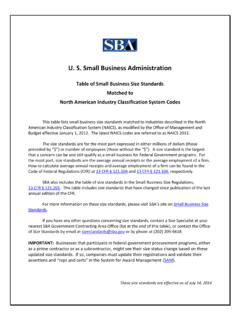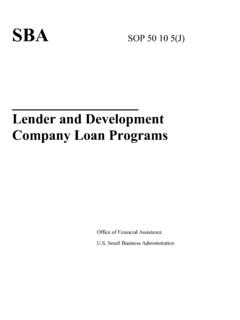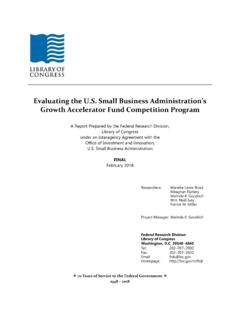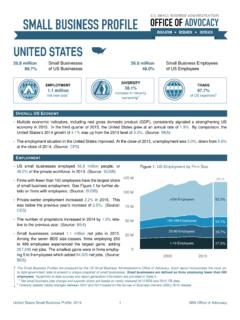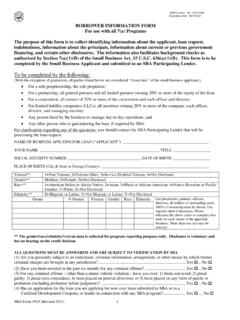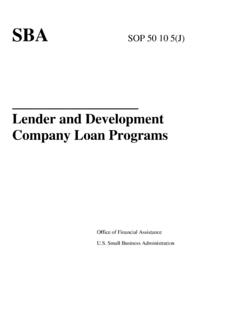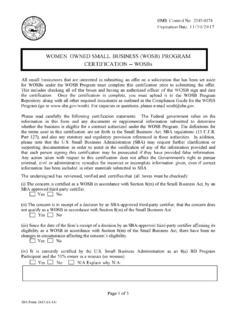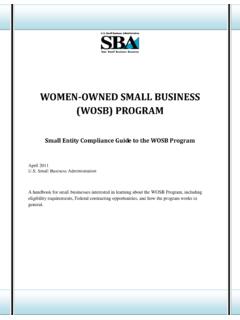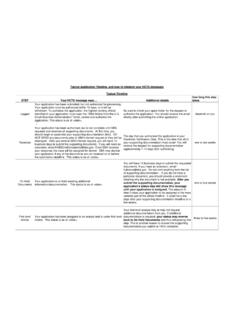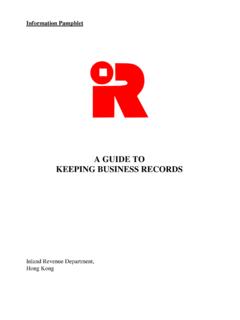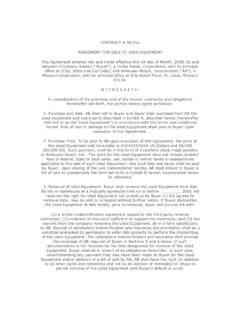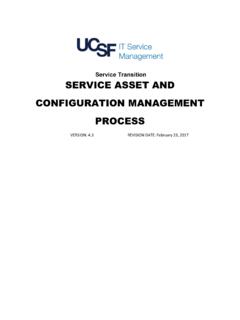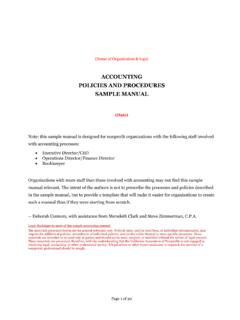Transcription of Record Keeping for a Small Business
1 Record Keeping for a Small Business Participant Guide Money Smart for a Small Business Curriculum Page 2 of 18 Table of Contents Welcome .. 3 What Do You Know? Record Keeping for a Small Business .. 4 Pre-Test .. 5 Keep Good Records .. 6 Legal Compliance .. 7 Discussion Point #1: Business Record Keeping .. 8 Record Retention .. 1 Common Record Keeping Tools .. 9 Business Software .. 11 Three Common Business Software Options .. 12 Discussion Point #2: Your accounting System .. 13 Business Software 13 Top Three Key Points to Remember .. 15 For Further Information .. 16 17 Evaluation Form .. 18 DISCLAIMER These training materials are intended as general guidance only and may or may not apply to a particular situation based on the circumstances.
2 The materials do not create any legal rights or impose any legally binding requirements or obligations on the Federal Deposit Insurance Corporation (FDIC) and Small Business Administration (SBA). The FDIC and SBA make no claims or guarantees regarding the accuracy or timeliness of this information and material. The content of this training material is not designed or intended to provide authoritative financial, accounting , investment, legal or other professional advice which may be reasonably relied on by its readers. If expert assistance in any of these areas is required, the services of a qualified professional should be sought.
3 Reference to any specific commercial product, process, or service by trade name, trademark, manufacture, or otherwise does not constitute an endorsement, a recommendation, or a preference by the FDIC and SBA or the United States government. Revision Date: 09-2011 Record Keeping for a Small Business Participant Guide Money Smart for a Small Business Curriculum Page 3 of 18 Welcome Welcome to the Record Keeping for a Small Business training. By taking this training, you are taking an important step toward building a better Business . This guide accompanies the Record Keeping for a Small Business PowerPoint Presentation. Objectives After completing this training, you will be able to: Explain the concept of Record Keeping and why Record Keeping is important to a Small Business .
4 Identify Record Keeping practices, rules, and tools which are commonly available to a Small Business . Explain how these Record Keeping practices, rules, and tools work. Identify benefits a Small Business derives from proper Record Keeping . Explain Record Keeping basics for a Small Business . Identify software products available for Small Business Record Keeping . Record Keeping for a Small Business Participant Guide Money Smart for a Small Business Curriculum Page 4 of 18 What Do You Know? Record Keeping for a Small Business Instructor: _____ Date: _____ This form will allow you and your instructors to see what you know about Record Keeping , both before and after the training.
5 Please read each statement below. Circle the number that shows how much you agree with each statement. Before Training After Training Strongly Disagree Disagree Agree Strongly Agree Strongly Disagree Disagree Agree Strongly Agree 1. I can explain the concept of Record Keeping and why Record Keeping is important to a Small Business . 1 2 3 4 1 2 3 4 2. I can identify Record Keeping practices, rules, and tools which are commonly available to a Small Business . 1 2 3 4 1 2 3 4 3. I can explain how Record Keeping practices, rules, and tools work. 1 2 3 4 1 2 3 4 4. I can identify benefits a Small Business derives from proper Record Keeping . 1 2 3 4 1 2 3 4 5.
6 I can explain Record Keeping basics for a Small Business . 1 2 3 4 1 2 3 4 6. I can identify software products available for Small Business Record Keeping . 1 2 3 4 1 2 3 4 Record Keeping for a Small Business Participant Guide Money Smart for a Small Business Curriculum Page 5 of 18 Pre-Test Test your knowledge of Record Keeping before going through the training. 1. Which of the following are reasons for Keeping good records? Select all that apply. a. Business detail tracking b. Planning c. Legal compliance d. Tax preparation 2. When creating a Record Keeping system, it s a good idea to _____. a. Wait until enough information is available to get started.
7 B. Start simple and refine later. c. Get a sophisticated system to anticipate future needs. d. Start after one year of operations. 3. Which of the following should be done before purchasing Business software? a. Create an information technology (IT) department b. Get a Business credit card c. Evaluate your Business needs d. Consult with the Internal Revenue Service (IRS) 4. Which of the following are Record Keeping tools? a. Manila folder b. Computer system c. File hosting system d. None of the above e. All of the above 5. For which type of Small Business is Record Keeping a good practice? a. Sole proprietor b. Partnership c. Corporation d. None of the above e.
8 All of the above 6. Record Keeping is the orderly and _____ practice of storing Business records. a. Corporate b. Legal c. Financial d. Disciplined Record Keeping for a Small Business Participant Guide Money Smart for a Small Business Curriculum Page 6 of 18 Keep Good Records The term Record Keeping refers to the orderly and disciplined practice of storing Business records. Record Keeping is one of your most important responsibilities as a Small Business owner. The success of your Business depends on creating and maintaining an effective Record system, whether your Business is a sole proprietorship, partnership, or corporation. Record Keeping ranges from simple manila folder filing systems to complex on-line electronic systems.
9 Whether simple or complex, a Record Keeping system must be easy to use and provide adequate storage and retrieval of records. Most importantly, the Record Keeping system you choose must be suited to your particular Business needs. The type, size, and complexity of your Business , as well as your Business available resources, will help to determine the Record Keeping system best suited to you and your Business . For more information on Record Keeping go to the web site and search for recordkeeping. Reasons for Keeping Good Records Record Keeping is not solely about fulfilling regulations or legal requirements. Record Keeping is also about understanding your Business , now and in the future.
10 Reasons why you should keep good records include: Detail Tracking Planning Legal compliance Tax preparation (federal, state, and local) Let s go through each of these reasons in further detail. Detail Tracking Owning a Small Business will require you to track a significant amount of information, such as customers, sales, and inventory. Without a proper Record Keeping system, you may lose sight of important Business details, leading to problems with serving your customers. If you do not know details about your customers, such as who your customers are and what your customers like, your Business may not be able to meet buyer demands. You risk disappointing a customer, maybe losing that customer forever.

